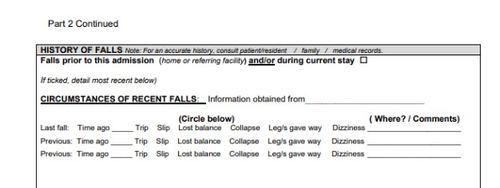The 2-Minute Rule for Dementia Fall Risk
Table of ContentsA Biased View of Dementia Fall RiskNot known Factual Statements About Dementia Fall Risk Not known Facts About Dementia Fall RiskExamine This Report about Dementia Fall RiskThe Of Dementia Fall Risk
Examining autumn threat aids the whole health care group develop a safer environment for each client. Guarantee that there is a marked area in your medical charting system where staff can document/reference ratings and document pertinent notes connected to drop avoidance. The Johns Hopkins Fall Risk Analysis Device is one of numerous tools your staff can utilize to help prevent adverse clinical occasions.Person falls in healthcare facilities are typical and incapacitating adverse occasions that continue despite decades of initiative to minimize them. Improving interaction across the evaluating registered nurse, treatment team, person, and individual's most included loved ones might enhance fall avoidance efforts. A team at Brigham and Women's Healthcare facility in Boston, Massachusetts, sought to create a standard fall avoidance program that centered around enhanced communication and client and family members interaction.

The technology team emphasized that effective execution relies on individual and team buy-in, integration of the program into existing operations, and integrity to program procedures. The group noted that they are coming to grips with just how to ensure connection in program application throughout periods of dilemma. During the COVID-19 pandemic, for instance, an increase in inpatient drops was associated with limitations in client interaction in addition to constraints on visitation.
The Dementia Fall Risk Statements
These cases are typically taken into consideration avoidable. To carry out the intervention, companies need the following: Accessibility to Fall pointers sources Fall ideas training and re-training for nursing and non-nursing team, including brand-new nurses Nursing operations that enable client and family involvement to conduct the drops assessment, guarantee use the avoidance strategy, and conduct patient-level audits.
The outcomes can be highly damaging, frequently increasing person decline and causing longer health center stays. One research estimated remains raised an added 12 in-patient days after a client loss. The Fall TIPS Program is based on appealing individuals and their family/loved ones throughout three major processes: evaluation, personalized preventative interventions, and bookkeeping to ensure that clients are involved in the three-step loss prevention process.
The patient assessment is based upon the Morse Loss Scale, which is a confirmed fall danger assessment tool for in-patient hospital settings. The scale includes the six most usual factors people in medical facilities fall: the individual loss background, risky conditions (including polypharmacy), usage of IVs and other external tools, psychological standing, stride, and wheelchair.
Each threat variable relate to several actionable evidence-based interventions. The nurse creates a plan that integrates the treatments and is noticeable to the care team, person, and family members on a laminated poster or published aesthetic aid. Registered nurses develop the plan while meeting with the client and the client's family.
Dementia Fall Risk Fundamentals Explained
The poster works as a communication tool with various other participants of the patient's care team. Dementia Fall Risk. The audit component of the program includes examining the individual's understanding of their threat factors and avoidance strategy at the device and healthcare facility degrees. Registered nurse champions conduct a minimum of 5 private meetings a month with clients and their family members to inspect for understanding of the autumn prevention strategy

A projected 30% of these falls outcome in injuries, which can range in extent. Unlike various other adverse occasions that call for a standardized professional action, loss prevention depends very on the requirements of the individual.
7 Easy Facts About Dementia Fall Risk Shown

Based upon bookkeeping results, one site had 86% conformity and two sites had more than 95% compliance. A cost-benefit analysis of the Autumn suggestions program in eight health centers approximated that the program expense $0.88 per patient to apply and led to savings of $8,500 per 1000 patient-days in straight costs connected to the avoidance of 567 drops over 3 years and eight months.
According to the technology team, organizations thinking about executing the program needs to conduct a preparedness evaluation and drops prevention voids analysis. 8 Additionally, organizations should make certain the look what i found necessary facilities and operations for application and create an application strategy. If one exists, the organization's Loss Prevention Task Pressure must be entailed in planning.
Little Known Facts About Dementia Fall Risk.
To start, organizations should guarantee conclusion of training components by nurses and nursing assistants - Dementia Fall Risk. Health center staff should evaluate, based upon the demands of a hospital, whether to utilize an electronic health and wellness document printout or paper version of the fall prevention plan. Carrying out groups ought to recruit and educate registered nurse champs and develop procedures for bookkeeping and coverage on loss data
Team require to be associated with the process of redesigning the process to engage individuals and household in the analysis and avoidance strategy process. Systems must be in place so that units can understand why a fall occurred and remediate the reason. Much more especially, nurses should have channels to provide ongoing comments to both staff and system management so they can change and enhance fall prevention workflows and communicate systemic troubles.